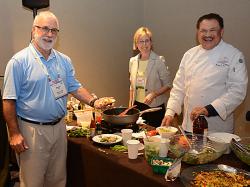Supermarket Dietitians Learn The Science Of Flavor At PBH Hosted Fresh Summit Program
November 2, 2015 | 3 min to read

Twenty-two Registered Dietitians attended the Produce for Better Health Foundations’ fourth annual Supermarket Dietitians (SRD) at the Produce Marketing Association’s Fresh Summit. On October 22, this group, representing nearly 10,000 grocery stores nationwide and Canada, listened to a lecture that provided clues as to why some people don’t like the taste of certain vegetables. Afterward, these nutrition experts were treated to a chef demonstration that put the scientific principles into action.
“The problem is that the word flavor should be a verb rather than a noun,” said Wayne Silver, Ph.D., professor of biology at Wake Forest University, in Winston-Salem, NC, at the start of his talk, “The Science of Flavor: Can it explain why my son doesn’t like broccoli?”
“In other words, when we say something doesn’t taste good, what we mean is that doesn’t flavor good. That’s because flavor is a combination of taste and smell as well as mouthfeel, audio cues (such as the crunch of an apple and visual presentation). Flavor is what determines what we like to eat, what we choose to eat, and ultimately our nutritional state.”
Silver provided a more in-depth description of smell and taste. To demonstrate the correlation of smell to flavor, Silver administered the “Jelly Bean” test. That is, he asked SRD’s to reach into a bag, and select a Jelly Bean while not looking at its color. Then, each person was instructed to hold their nose, put the candy into their mouth, chew, and try to discern the flavor. It wasn’t until the SRD’s unclasped their noses that the flavor of the bean became apparent. This test separates the sensations of taste and smell while exemplifying how the brain needs to receive signals from both nose and mouth to accurately sense flavor. It’s also the science behind the iconic kid-move to hold their noses when parents insist they eat what they consider “yucky” veggies.
Why kids and adults think some veggies taste “yucky” boils down to their genetic predisposition. Taste is hugely important. Silver referenced the International Food Information Council’s 2015 Food & Health Survey, which revealed 83 percent of respondents said the biggest impact on deciding what foods to buy is taste.
There are five tastes: salty, sweet, bitter, sour and umami. Silver said research shows there may be a sixth taste — fat (or fatty acids). Silver had each SRD put a small piece of paper impregnated with a substance called 6-n-propylthiouracil (or PROP) on their tongues. Those who found the substance extremely bitter are genetically determined Supertasters; those who found it slightly or not bitter are non-tasters. One fourth of the population are Supertasters, and two thirds of this group are women.
“Supertasters don’t like bitter vegetables,” said Silver. The Top 5 bitter vegetables, assessed in a 2006 study measuring phytonutrients in foods, were bok choy, broccoli, Brussels sprouts, cabbage and cauliflower. Sweet can mask the bitter taste of these vegetables and make them more palatable to supertasters. For example, a 2008 study showed Brussels sprouts served with sweetened cream cheese were judged less bitter. After this introduction, test subjects continued to like the vegetable even without it being served sweetened.
“We can improve the taste and smell of vegetables by masking the flavor with sugar,” said Silver.
In the second half of the program, Chef Don McMillan, CEC, AAC and Master Chef, who displayed his culinary skills on numerous TV cooking shows, put this science to the test. McMillan showed how natural sugars in fruits could complement bitter-tasting vegetables to create a delicious dish. For example, he made a Broccoli and Apple Frittata; Whole Grains, Brussels Sprouts and Kale salad, which paired these two vegetables in addition to spinach with raisins and pairs; and Stir-Fry Asian Vegetables with Brussels Sprouts and Kale, that included dates in the dish.
This educational session was one of several that SRDs participated in during their four-day Fresh Summit program, hosted by Elizabeth Pivonka, Ph.D., RD, president and chief executive of Hockessin, DE-based Produce for Better Health Foundation. The SRDs also enjoyed a retail tour, networking opportunities and dedicated time to meet produce exhibitors on the exhibition floor.
Source: PerishableNews.com
